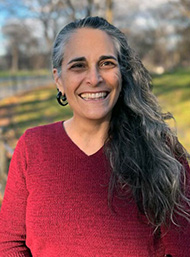Explore our
Rethink Learning
Labs projects today:
Projects
Our Mission
The purpose and mission of Rethink Learning Labs is to advance innovative, research-driven, educational practices in PreK-12 classrooms that support the effective integration of emerging technologies aligned to curricular objectives, including best practices in STEM education.
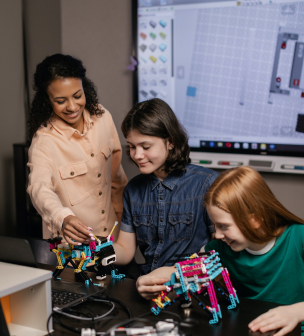
Rethink Learning Labs has the following objectives:
- Transform teaching, learning, and leadership through applied research.
- Identify disruptive technologies that can benefit PreK-12 students and educators.
- Develop research-driven programs that support the integration of disruptive technologies and STEM into the classroom.
- Collaborate with districts, schools, educational leaders and classroom educators to cultivate evidence-based best practices.
- Create practical and sustainable pathways for PreK-12 leaders to support innovative programs.
- Build and nurture communities of practice among content-specific educators that enable them to build active networks to support their instructional goals.
Meet Our Team

Alex started his career as a Physics teacher and has been leading educational organizations for over 25 years. He has founded two professional learning organizations focused on empowering educators to unlock the potential of every learner. Alex consults with leading education companies and nonprofits on strategy and execution to impact PreK-12 education. He is President of an educational foundation that has grown more than tenfold under his leadership, and Chairman of a nonprofit foundation focused on mental wellness for children. Alex has a BS in Physics, a MSc in Econometrics and Financial Engineering and a MS in Instructional Design.

Chandra Orrill, Ph.D. is an educational researcher with expertise in mathematics education and instructional technology. Before joining Rethink Learning Labs, Chandra was a Professor in STEM Education at UMass Dartmouth where she led the Kaput Center for Research and Innovation in STEM Education for several years. Chandra is passionate about working with teachers to create inquiry-oriented, technology-based, and discussion-oriented learning spaces for mathematics and computational thinking. Chandra has served as Principal Investigator or Co-Principal Investigator on over $13 million in grants over the past 20 years. She is published in mathematics education and learning sciences journals and is active in professional organizations in math education and the learning sciences.
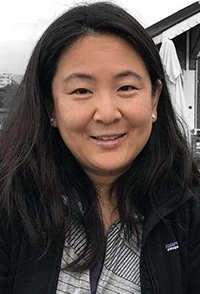
Blakely Tsurusaki, Ph.D., is an educator and educational researcher with experience teaching and researching formal and informal STEM education. She has expertise in curriculum development, program development, and professional development in STEM education and her research interests include STEAM, environmental education, and how to better make connections between students’ everyday lives and STEM, particularly in marginalized communities. She has served as a PI or co-PI on federally funded and foundation grants. She holds a Ph.D. in Teaching, Curriculum, and Educational Policy from Michigan State University, an M.Ed. in Science Education from the University of Georgia, and a B.S. in Biology from the University of Puget Sound.
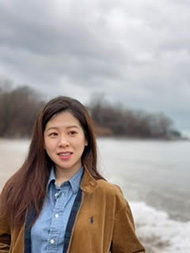
Kun Wang, Ph.D. is a postdoctoral fellow with deep interest in teacher knowledge. She has a Ph.D in STEM Education from UMass Dartmouth as well as a B.S. Civil Engineering. Kun taught SAT and AP STEM subjects for five years in China. Her passion is working with PreK-12 teachers to promote playful classroom engagement in an interactive learning environment.
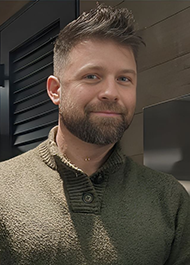
Ezra Gouvea, Ph.D. grew up in Northern California, studied topology and geometry, taught arithmetic and algebra to adult learners, and enjoys doing design-based research in Education. His research investigates the ways that close listening and attunement to others is a component of scientific inquiry, dialogic teaching, as well as work to repair harm enacted in STEM. He has a Master’s degree in Mathematics, has designed and led professional development for teachers, and has a Ph.D. in STEM Education. As a postdoctoral fellow at Rethink Learning, he studies the contexts where computational thinking can emerge in K–12 classrooms.
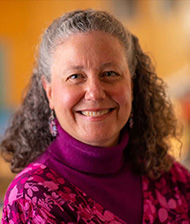
Kym Welty is a Grant Support Specialist. She holds a Bachelor’s degree in Psychology and Master’s in Education degree in Counseling. She has over 15 years of experience managing grant-funded projects involving PreK-12 teachers, teacher preparation, professional development and STEM education. Her interests include increasing the number of young people (especially women and BIPOC) who enter into STEM related career tracks.
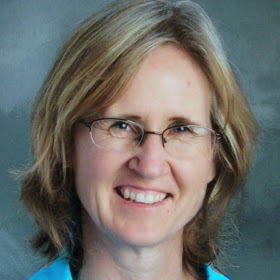
Bonni is a PhD candidate in the Instructional Technology and Learning Sciences department at Utah State University. She received a bachelor’s degree in mathematics with a minor in computer programming and a secondary teaching certificate from Weber State University, Utah. She earned a master's in education technology from Boise State University, Idaho. Bonni has enjoyed a rich and varied career in education. She has taught in district, charter, and private PreK-12 schools. She has been an online teacher in both K12 and university settings. She has taught math, computer programming, financial literacy, video and audio production, and integration of innovation and technology in education. She has provided EdTech expertise at her schools and led the way in adopting technology. She has published work on professional development and change readiness in education. She is researching change readiness, math anxiety, and gamification. She is developing a cooperative play-based math curriculum.
Eileen Murray, Ph.D., is a seasoned educator and researcher in mathematics education. Prior to her current role at Rethink Learning Labs, Eileen served as an Assistant/Associate Professor in the Department of Mathematical Sciences at Montclair State University, focusing on the intersection of mathematics education, equity and access in STEM, and reflective teaching practices. With a strong background in both teaching and academic research, Eileen brings a wealth of experience from her time as a high school teacher, and a middle school coach, and her extensive studies in mathematics education in various institutions of higher learning. Her research is dedicated to improving the preparation and ongoing development of secondary mathematics teachers, aiming to enhance student learning through innovative teaching methods. Eileen's work has been influential in shaping teacher education programs, and she continues to be an active contributor to the field, with numerous publications and a significant role in professional mathematics education communities.
Core Beliefs:
- We believe all students can learn
- We believe that education is a complex system
- We believe that teaching is a multidimensional craft
- We believe that well-designed tools and curricula in the hands of well-prepared educators can support student learning
- We believe that teaching, learning, and leadership can be improved through research and evidence-based practices
Service Offered:
- Research, Design, & Development
- Curriculum Development
- Professional Development
- Data Collection & Analysis
- White Papers
- Measurement, Assessment, & Evaluations
- Mixed methods
- Qualitative
- Quantitative
- Grant Writing Support
- Conceptualization
- Evaluation
- Feedback on proposal drafts
